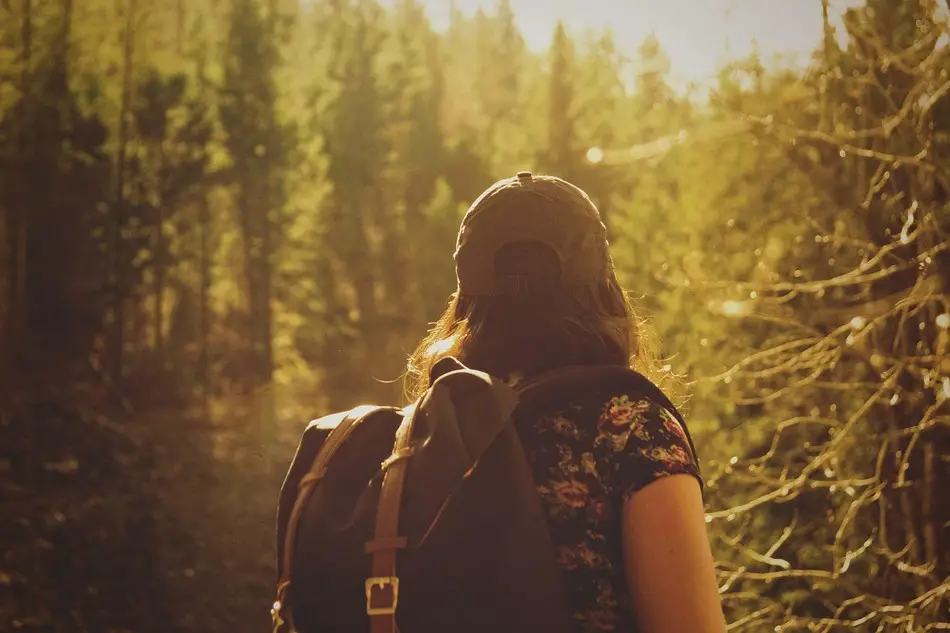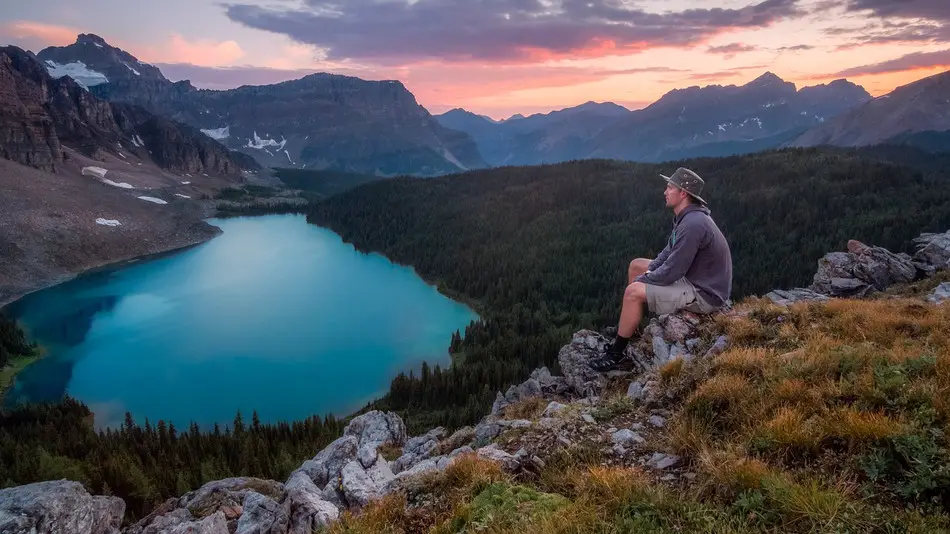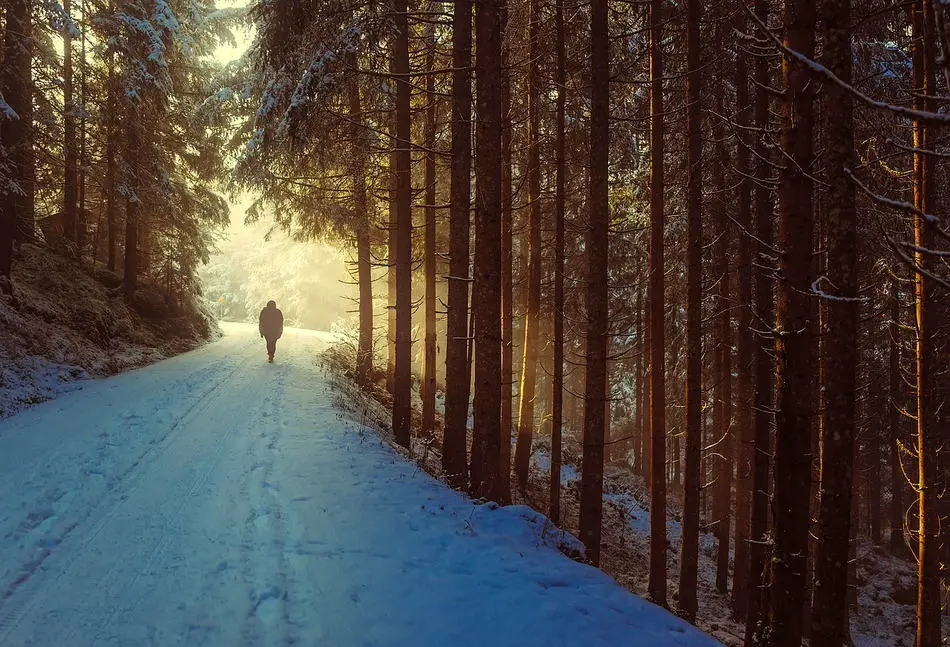Hiking is a personal passion of mine. Nothing beats just going out there, into the wild, spending good quality time with yourself, your friends and nature. But I often wonder (as I wander): what are the best conditions for a casual hiker, as far as the factor of time is concerned?
In this article, I will answer both versions of this question:
- What are the best hours to hike?
- What is the best season to hike?
I will give brief answers to each question, but will also dig deeper, providing scientifically confirmed information and comparing all hours and all seasons. Some of the answers are summarized in the following video:
What Are The Best Hours to Hike?
The best hours for hiking are in the morning between 6:00 and 9:00 and in the afternoon between 15:00 and 19:00. Scientific studies proved that during these hours your body is at its top performance and full of energy.
Hiking is basically walking in the nature, whether you’re hiking alone or with your loved ones. The nature is always beautiful, every hour of a day, there is always something unique to see. The real issue is not with the view. The biggest obstacle for your hiking will not be a hill that you need to climb or animal tracks that you should avoid. The biggest challenge is your body and when it’s most ready for a hike.
I can speak from my own experience, and the experts who researched this subject agree with me. Morning and afternoon are the easiest hours, especially if you’re doing this mostly for fun. Of course, other periods of times can be great as well. Here are some quick summaries for every time of day.
Morning (6AM to 10AM)
- The temperatures are usually the lowest, you do not sweat that much.
- It’s the beginning of a day, the daily rut has not settled in yet. Your mind is the freest for this activity, and hence your body is the most energized.
- Furthermore, the energy you get from a morning hike serves you for the rest of the day.
- It’s probably the only really free time that a working person has.
- A morning hike is actually your morning exercise. Several studies showed that morning exercises are the most efficient in burning calories and improving your heart and lungs.
Pro tip: make sure you stretch before any hike, but especially before hiking in the morning. Your muscles are still somewhat stiff after a night of sleep.
Noon (about 10AM to 3PM)
- Again, if you’re a working person, this could be your midday break from the routine.
- A noon hike or walk can re-energize you for the second half of a day.
- Unlike in the morning, your body is already warmed up. Then again, you might need another stretch after sitting for hours.
- You might be limited by time if you’re simply on a lunch break. There is no time for a hike, maybe just for a walk in the neighborhood (if you skip lunch, which is usually not recommended).
- Your lungs are not at their peak at these hours, as researches discovered.
As you can see, noon is not the ideal time for this hobby.

Afternoon (3PM to 7PM)
- Serious scientific studies point to the afternoon as the period when your body is at its top performance. Ask any fitness coach, these are the best hours for any physical activity.
- This is the time when your muscles are the most limber.
- Your lungs also operate at their best.
- You can burn away the calories, especially if you had a big lunch.
- This is a great period to release the stresses of the work before you relax in the evening.
Pro tip: see if you can commit to making this a daily habit, a good hike to sign off your day.
Evening
- A possible pro is similar to the morning. The temperatures are cooler as the day ends and the sun settles.
- However, by this hour many of us could be exhausted. A hike might become a chore and not a pleasurable pastime.
- You might require a couple of hours to relax afterwards, otherwise you will not fall asleep that easily. That means adding more to your evening routine.
- Generally speaking, exercising at the evening can be great and a lot of people prefer these hours. But hiking in the darker hours provide a very limited experience. Your surrounding are not lit that well. You will have difficulties enjoying the views, as well as seeing obstacles and potentially dangerous animals.
Therefore, the evening could also be not that suitable for hiking. But if you decide to hike in the darker hours after all, take the precautions mentioned in this video:
What is The Best Season to Hike?
The best season for hiking is spring, especially if you plan to hike for an entire day or longer. This is when the weather conditions are ideal for a prolonged physical effort. Additionally, this is the best time to observe nature during the hike.
It goes without saying (but I will say it nonetheless): every season can be excellent for hiking. We all have our personal preferences; we all react differently to the heat and the cold; there are different things to see in the nature throughout the year. But let us quickly see what every season has to offer and why I prefer the spring.
Spring
- For those of us living in the Northern Hemisphere, spring (like hiking in the morning) usually has the best temperature for hiking. Not too cold, not too warm, the cool air helps your body to function at its full capacity.
- The spring conditions allow you to make the most distance during the day hours. If you’re planning a long trek, this can be the ideal season for you.
- This is a great time to observe nature, as it wakes up after the winter slumber. The snow thaws, the trees are green again, the first flowers stretch up. The water is flowing once again, fish swimming, dragonflies hovering. The animals end their hibernation and brumation. Without getting too poetic, spring is a real feast for eyes and ears.
Thanks to the nicer weather, you need to carry less equipment. There is less need for warm clothes, thick sleeping bags, and so on. The rest of the items you bring can be comfortably packed in the TETON Sports Scout 3400 Internal Frame Backpack, Amazon’s most recommended backpack. It’s perfect for light hiking trips and can fit any body size and shape.
Summer
- The first con is the most obvious one. The heat. You will perspire much more and will need to carry even more water. By the way, here a post that tells you exactly how much water you need to drink while hiking.
- You will need to seek shade more often, as the summer sun offers not so comfortable conditions for a long hiking.
- Depending on where you wish to trek, some local factors are also more severe during the summer, among them are dust in the air and dried out water sources.
- Your body might not tolerate the heat and you will require frequent rests.
- The abundance of bugs can be a real nuisance.
- With all that in mind, the right gear and equipment can improve your summer hike greatly.
Autumn and Winter
- The unpleasant condition of the summer are reversed. Now it gets too cold. While warm clothing can shield you from the biting frost, your body is not at its best during the cold seasons. The chances for getting sick are higher, and the woods not always provide with a medicine for the common cold.
- While the winter views can be breathtaking, there is less to see as far as the wildlife is concerned. The trees are covered in the snow and seem always dead. The animals are mostly nowhere to see.
- Then again, no bugs!
- The harsh weather makes it more difficult to build and maintain a camp.
Generally speaking, the snow and the ice can make whole regions unpassable. However, a solution exists! If you decide to hike in winter and worry whether your shoes can deal with snow and ice, try Stainless Steel Cleats (found on Amazon). These durable hiking crampons were successfully tested in the lowest possible temperatures and under the harshest of conditions. They will prevent slipping, making your hiking a pleasant and safe experience.
The Best Places to Hike in the USA and the World
Now that you have an idea when is a good time to hike, you need to decide where to hike. The following two books on Amazon help you answer this question. If you’re in the United States, then get everyone’s favorite travel guide, Moon USA National Parks: The Complete Guide to All 59 Parks. This book completely covers all national parks, has all the details, maps, transportations tips, hiking path suggestions, and so much more. You will get all the important information even before you get there, such as climate, wildlife, history, safety, etc. A must-have book to take with you on your next hiking trip.
If you live or travel elsewhere in the world, I warmly recommend Great Hiking Trails of the World: 80 Trails, 75,000 Miles, 38 Countries, 6 Continents. I have the same book at home. This beatifully illustrated book can inspire you what hiking trip you should take next, as it showcases the most wonderful hiking trails of the world. There are maps, astounding photos, details explanations about each place’s history, natural life, most scenic spots, local culture, and so on. See the world’s greatest natural treasures and get this book to be your loyal guide.
Related Questions
What day of the week is the best time to go hiking? The popular trails are the busiest during the weekend. If you prefer solitude or only a small group of friends and family, then do not hike on Saturdays and Sundays. Monday through Friday should be your choice. Less crowded hiking trails provide the most enjoyable experience.
What is the best hiking temperature? There is actually a scientific answer to this: 50F/10C to 60F/16C. As it gradually becomes hotter than this range, so does the hiker’s capability reduces. Furthermore, warmer temperatures require adjustments and equipment, such as a sunblock, hat, more water to carry and frequent rest stops.
When does the hiking season start? In many national parks, the hiking season officially starts in spring. That’s when a local authority becomes quickly available, should an emergency take place. In fact, due to the harsh winter weather, hiking earlier than spring is sometimes strictly prohibited.
What equipment should I bring? Water, appropriate clothing and a navigation device are among the items that you really must bring with you. There are good reasons for them. Here is a post that fully explains what you should bring for a hiking trip and why.







